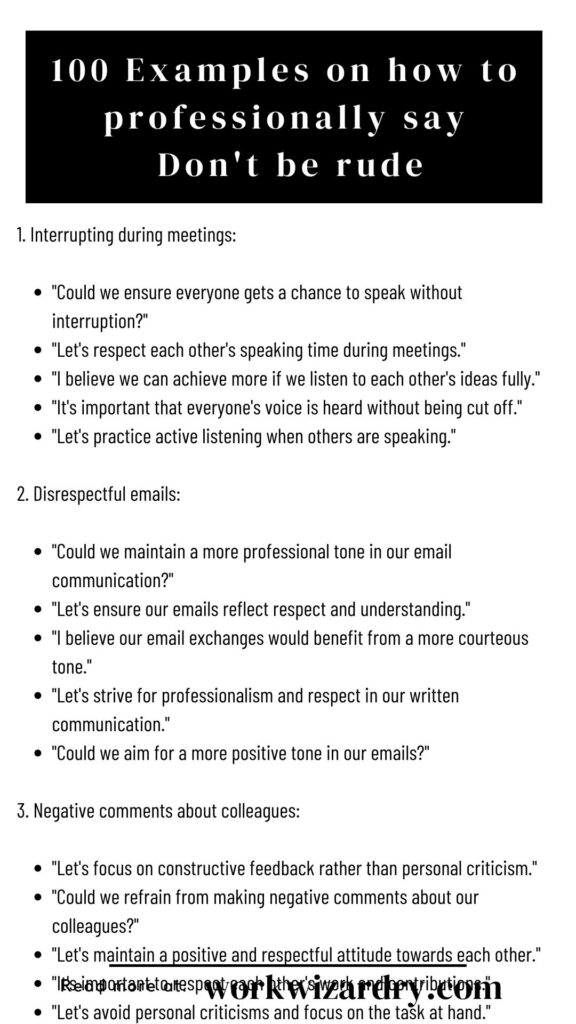In any workplace, maintaining a respectful and professional environment is crucial for fostering collaboration, productivity, and employee well-being.
However, there may be instances when individuals exhibit rude behavior, which can disrupt the harmony and hinder progress.
Addressing such behavior effectively and professionally is essential to maintain a positive work culture.
In this comprehensive guide, we will discuss how to say don’t be rude professionally, politely and explore various strategies, tips, and examples to help you navigate the delicate task of addressing rudeness in the workplace.
Whether it’s dealing with interrupting colleagues during meetings, inappropriate comments, or disrespectful emails, we’ve got you covered.
With over 100 examples and practical advice, this guide will equip you with the tools to handle different situations professionally.
From providing constructive feedback to setting boundaries, you’ll learn how to communicate assertively while maintaining respect and empathy.
Let’s dive in and discover the strategies that will empower you to create a respectful workplace culture.
Table of Contents
How to say don’t be rude professionally?
Addressing rudeness professionally requires tact and diplomacy.
Avoid direct accusations or confrontational language, as this can escalate the situation.
Instead, focus on the behavior, not the person.
For instance, instead of saying “You’re being rude,” you could say, “I noticed that your tone in our last conversation was a bit harsh. Could we aim for a more respectful dialogue?”
Use “I” statements to express your feelings without blaming the other person.
For example, “I felt uncomfortable when…” This approach helps to prevent the other person from becoming defensive.
Also, it’s crucial to provide constructive feedback.
Rather than just pointing out the issue, suggest a more appropriate way of behaving.
For instance, “I believe our discussions would be more productive if we could maintain a more positive tone.”
Remember, your goal is to foster a more respectful and productive environment, not to chastise or embarrass the other person.
Always approach the conversation with empathy and understanding, acknowledging that everyone can have off days.
Lastly, maintain a calm and composed demeanor throughout the conversation. This will help to set the tone for a respectful and constructive dialogue.
Also read: How To Professionally Say Don’t Talk To Me Like That And Don’t Be Rude? (35+ Examples And Tips)
Further let’s explore some example responses on how to professionally tell someone they are rude?

100 Examples on How to professionally say don’t be rude
Here are some professional ways to say don’t be rude:
1. “I understand that you may be frustrated, but please refrain from being rude.”
2. “Your language and tone are not appropriate for a professional conversation.”
3. “I would appreciate it if you could choose your words more carefully and speak respectfully.”
4. “I understand that emotions may be running high, but please express yourself in a professional manner.”
5. “I’m sorry, but I cannot tolerate rudeness or disrespect in our communication.”
6. “Please be mindful of your language and tone, as they can impact the effectiveness of our discussion.”
7. “Let’s approach this conversation with a professional and respectful attitude.”
8. “Let’s maintain a respectful and courteous dialogue to reach a positive outcome.”
9. “Please refrain from using derogatory language as it can harm the integrity of our communication.”
10. “Let’s strive to have a productive discussion by avoiding any form of rudeness or impoliteness.”
11. “I respectfully request that you communicate in a civil and courteous manner.”
12. “Please refrain from using offensive language, as it can derail our discussion.”
13. “I would appreciate it if you could refrain from using any language that could be perceived as disrespectful.”
14. “It’s important to maintain a professional and respectful tone to build a positive relationship.”
15. “You have crossed the line with your behavior. Please be professional and respect the boundaries.”
16. “I’m happy to listen to your concerns, but please express them in a manner that is respectful to both of us.”
17. “Let’s have a productive and courteous exchange to achieve our goals.”
18. “I value professionalism and respect in our communication, and I ask that you do the same.”
19. “Using rude language is not an effective way to convey your message, please choose your words carefully.”
20. “Let’s communicate in a manner that is appropriate for a professional setting.”
21. “Please avoid using any language that could be perceived as discriminatory or offensive.”
22. “Being rude or disrespectful only serves to undermine the conversation and impede progress.”
23. “I understand that we may have different opinions, but let’s express them respectfully and listen to each other.”
24. “It’s important to remember that communication is a two-way street, so let’s be respectful of each other’s perspectives.”
25. “Please refrain from using impolite language.”
26. “I would appreciate it if you could communicate with more courtesy.”
27. “Let’s keep the conversation respectful and civil.”
28. “It’s important to maintain a professional and polite tone.”
29. “Name-calling or insulting language is not acceptable.”
30. “Please choose your words carefully and avoid being disrespectful.”
31. “Let’s maintain a professional and respectful demeanor.”
32. “I would kindly request that you refrain from making rude comments.”
33. “Please be mindful of your tone and language.”
34. “Let’s focus on the issue at hand and avoid using derogatory language.”
Also read: 200+ Funny Ways To Tell Someone To Mind Their Own Business At Workplace Or Personal Conversations

Examples on how to tell someone they are rude at work for different situations
Here are some example phrases on How to professionally say someone is rude at workplace for different situations:
1. Interrupting during meetings:
- “Could we ensure everyone gets a chance to speak without interruption?”
- “Let’s respect each other’s speaking time during meetings.”
- “I believe we can achieve more if we listen to each other’s ideas fully.”
- “It’s important that everyone’s voice is heard without being cut off.”
- “Let’s practice active listening when others are speaking.”
2. Disrespectful emails:
- “Could we maintain a more professional tone in our email communication?”
- “Let’s ensure our emails reflect respect and understanding.”
- “I believe our email exchanges would benefit from a more courteous tone.”
- “Let’s strive for professionalism and respect in our written communication.”
- “Could we aim for a more positive tone in our emails?”
3. Negative comments about colleagues:
- “Let’s focus on constructive feedback rather than personal criticism.”
- “Could we refrain from making negative comments about our colleagues?”
- “Let’s maintain a positive and respectful attitude towards each other.”
- “It’s important to respect each other’s work and contributions.”
- “Let’s avoid personal criticisms and focus on the task at hand.”
4. Ignoring or dismissing ideas:
- “Could we ensure all ideas are given due consideration?”
- “Let’s value each other’s contributions and ideas.”
- “I believe we can benefit from considering all perspectives.”
- “Let’s ensure everyone’s ideas are acknowledged and considered.”
- “Could we make sure to give each idea a fair hearing?”
5. Loud or disruptive behavior:
- “Could we maintain a quieter and more conducive work environment?”
- “Let’s respect each other’s need for a peaceful workspace.”
- “I believe we can be more productive in a quieter environment.”
- “Let’s aim for a less disruptive atmosphere in the office.”
- “Could we keep the noise levels down to respect everyone’s workspace?”
6. Inappropriate jokes or comments:
- “Could we avoid making inappropriate comments or jokes?”
- “Let’s maintain a professional and respectful atmosphere.”
- “I believe our workplace would benefit from more appropriate humor.”
- “Let’s ensure our humor is respectful and inclusive.”
- “Could we refrain from making comments that might make others uncomfortable?”
7. Not respecting personal space:
- “Could we respect each other’s personal space?”
- “Let’s ensure we’re mindful of each other’s comfort zones.”
- “I believe we can foster a better work environment by respecting personal boundaries.”
- “Let’s be aware of each other’s personal space.”
- “Could we be more mindful of maintaining personal boundaries?”
8. Not contributing to team tasks:
- “Could we all ensure we’re contributing equally to team tasks?”
- “Let’s make sure everyone is pulling their weight in our projects.”
- “I believe our team would benefit from everyone’s active participation.”
- “Let’s ensure everyone is doing their part in our team tasks.”
- “Could we all commit to contributing to our team’s success?”
9. Being late for meetings or deadlines:
- “Could we all strive to be punctual for meetings and deadlines?”
- “Let’s respect each other’s time by being punctual.”
- “I believe our team would benefit from everyone’s timely contributions.”
- “Let’s ensure we’re all meeting our deadlines and commitments.”
- “Could we all make an effort to be on time for our meetings?”
10. Not listening or paying attention:
- “Could we all ensure we’re actively listening when others are speaking?”
- “Let’s respect each other by paying attention when someone is speaking.”
- “I believe we can learn more from each other if we actively listen.”
- “Let’s make sure we’re all present and attentive during discussions.”
- “Could we all commit to being more attentive during our conversations?”
Conclusion:
In conclusion, addressing rudeness professionally requires tact, empathy, and effective communication.
By focusing on behavior rather than personal attacks, using “I” statements, providing constructive feedback, and maintaining a calm and composed demeanor, you can address rudeness in various situations.
Remember to choose the right time and place, listen actively, and seek resolution.
By promoting respect and professionalism, you can foster a positive work environment and enhance collaboration and productivity.




